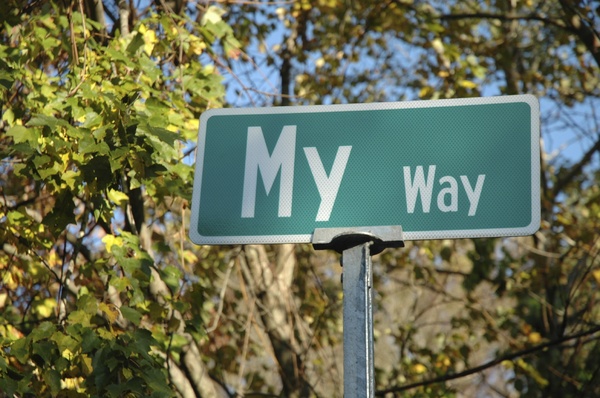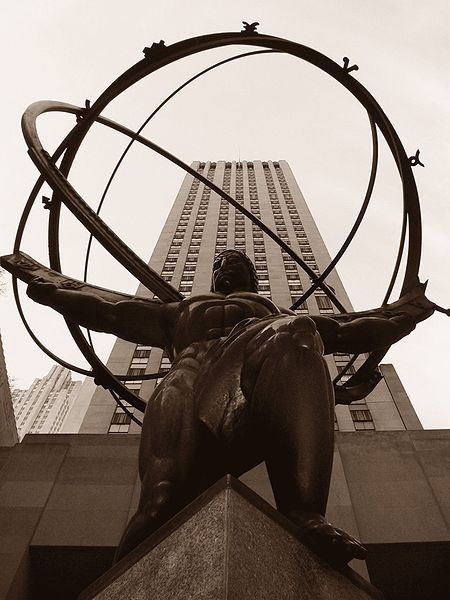 Peter Parker’s Uncle Ben once told him, almost as if he knew Peter had gained spider-powers, “With great power comes great responsibility.†Naturally, I believe everything I read in Marvel Comics, but I must ask: to whom does one owe this responsibility? Nietzsche and Ayn Rand will not allow me easily to accept that one owes the exercise and the fruit of one’s talents to society at large. One must not let oneself become a slave to the mass, or one will soon be trying on for size the binding ropes of the Lilliputians. They will happily exploit one’s talents in place of those they lack or are too lazy or fearful to exercise for themselves. And they will seek to curb one’s own free use of one’s talents as one sees fit. Would you strive to reach the stars? Too bad! We want you to apply your energies and resources to supporting the shiftless.
Peter Parker’s Uncle Ben once told him, almost as if he knew Peter had gained spider-powers, “With great power comes great responsibility.†Naturally, I believe everything I read in Marvel Comics, but I must ask: to whom does one owe this responsibility? Nietzsche and Ayn Rand will not allow me easily to accept that one owes the exercise and the fruit of one’s talents to society at large. One must not let oneself become a slave to the mass, or one will soon be trying on for size the binding ropes of the Lilliputians. They will happily exploit one’s talents in place of those they lack or are too lazy or fearful to exercise for themselves. And they will seek to curb one’s own free use of one’s talents as one sees fit. Would you strive to reach the stars? Too bad! We want you to apply your energies and resources to supporting the shiftless.
The mass fears ability and always seeks to co-opt it and to dilute it. Did you see the movie Captain America: The First Avenger? Remember how the Army shoots scrawny Private Steve Rogers full of the experimental Super Soldier Serum, whereupon he turns into a powerful Adonis, a one-man army? And then what happens to him? The government assigns him to go on stage to promote War Bonds. That’s it. Until he strikes out on his own to rescue troops trapped behind enemy lines. He is a hero, and serves others, only once he breaks free of the clinging restraints of the Collective.
Have you ever been forced to work with a committee, whether of stupid classmates or of dim-witted fellow employees or of idiot church deacons? You have knowledge and ideas. They don’t. You notice two things happening simultaneously. First, you wind up doing all the work, though the whole committee gets the credit. But you don’t mind it, because that way at least the job gets done better than it would have if you had let the dead wood actually participate. You’d rather have them share your A than you sharing their C. Second, the dead wood will whittle away at the excellence of your best ideas. What do you expect? They have only mediocrity, and that’s what they contribute.
The Collective always and necessarily dilutes the talents of the gifted. They don’t want to be shown up as mediocre, so they will always try to drive down any excellence they see arising. Somebody else doing a good job makes them look bad. Poor workers always resent good workers. This is why Teachers Unions oppose competency testing or ranking. The herd huddles together, as if adding so many zeroes could total more than one big zero.
I remember my contempt and disgust when I heard a Unitarian minister at a conference say that the theologian must seek to articulate the beliefs of his “faith†community rather than develop his or her own ideas. If he did the latter, he might be considered a philosopher of religion, but a real theologian exalts the mass and eschews individualism. Ugh…
Lucky for me, when I was a teenager I watched Patrick McGoohan’s The Prisoner and learned its lessons well. And yet I cannot deny Uncle Ben’s lesson either. If one does have great powers, to whom is one in debt? I think I know: one owes a debt to oneself.
The way I look at it, which I happily learned reading Aristotle’s Nicomachean Ethics, is that one possesses an individual path (what some call a dharma) constituted by the law of one’s own being. One has a built-in drive and goal, planted by one’s genes and watered by one’s environment, which will eventually blossom forth into a life and a destiny. Only so can one find fulfillment. You “must†fulfill your potential or you will find yourself frustrated. And this is only and precisely because your potential is you. To cultivate it and to express it and to apply it is autonomy, obedience to the command of your own nature, not heteronomy, which would be the command of another. A good teacher tries to get you to do your best not as an assignment, like Pharaoh commanding the Israelites to make bricks without straw, but rather in order to encourage your own self-development. You owe it to yourself.
This is why, as Rand said, selfishness is a virtue. Who has a better claim on your abilities and your freedom? Not the mass, the mob, the Collective. It doesn’t “take a village†to determine what you ought to do with your life. I prefer Billy Joel to Hillary Goddam Clinton: “I don’t care what you say anymore. This is my life.â€
But isn’t there some larger social dimension? As the quotable George Costanza bellowed when no one passing him on the street would answer a simple question, “We’re living in a society here!†How does that work? Here I think of the “egoism†(but not egotism) of Epicurus, who (in effect) compared society with an orchestra. It works only when each musician concentrates on his own sheet music and plays his own instrument. Imagine the chaotic cacophony if everybody butted in on his neighbor’s performance. Dropping his or her own trumpet and grabbing the other guy’s violin, “Here, let my take care of that for you!†You owe something to the rest of the orchestra, all right: to do a good job with your own performance!
 I am responsible not to you, but to me. You are responsible not to me, but to yourself, and that’s the way to get a resulting society that will work best for us both, for us all. I don’t want to succeed at your expense; I want you to succeed, too!
I am responsible not to you, but to me. You are responsible not to me, but to yourself, and that’s the way to get a resulting society that will work best for us both, for us all. I don’t want to succeed at your expense; I want you to succeed, too!
But what about poor souls who are disadvantaged, who cannot excel in such a way as to secure their own weal? Philanthropy is better than forced government collectivism. The superman will naturally look with compassion upon the unfortunate. He will not render assistance in obedience to a government which demands the right to confiscate and redistribute his resources or to commandeer his talents. He will instead act with holy condescension. He does not pretend that no “descent†is involved, because he recognizes that the delusion that all are equal and equally “entitled†is part and parcel of the Collectivist ideology of the slave herd, and he will not be party to that.
So says Nietzsche.
So says Rand.
So says Zarathustra.

10 Responses to Owe No Man Anything